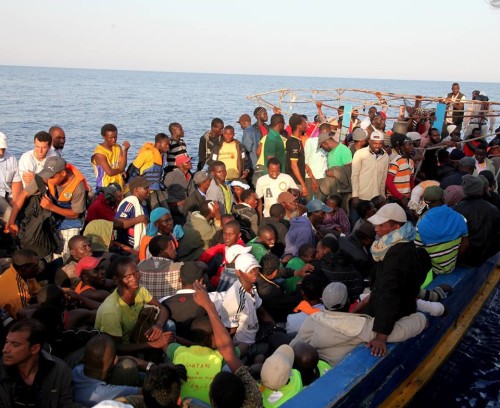An average of 83 Nigerians crossed illegally from Nigeria to Europe, daily, via the Mediterranean in the first nine months of 2016, data by the European Union shows.
The daily figure was extrapolated from the 22,500 illegal Nigerian migrants that the EU said crossed the Mediterranean Sea to Europe between January and September this year.
This figure in the first 9 months of 2016 is against the 23,000 who crossed in the whole of 2015.
The Deputy Head of EU Delegation in Nigeria, Richard Young, made this disclosure on Thursday at a media workshop in Abuja.
Young expressed concern that the number of Nigerians taking dangerous adventure through Mediterranean to Europe within nine months in 2016 was higher than those who did same throughout 2015.
According to him, there has been huge increase in migrants crossing border without the right travel document to Europe from all over the world.
“In 2014, the number of people travelling irregularly into Europe clinched 280,000 people; in 2015 it rose to 1.8 million in 2015.
“From January to September 2016, the number is about 420,000; we are expecting that the number will rise to 800,000 before the end of the year.
“Within this number, people coming from Nigeria in 2012 was 800, in 2013 the number was 2,900, in 2014 the number was 8,700 in 2015 the number was 23,000.
“And between January and September 2016 the number is 22, 500,” he said.
While expressing concern that the people crossed Mediterranean on boats, he said, “3,700 drowned in Mediterranean Sea in 2016 alone, which indicated that one in 50 people drowned.”
He, however, said that the EU had put in place measures to address illegal migrants from Nigeria.
Young explained that these measures include the three ‘R’ policy of return, re-admission and reintegration for the illegal migrants.
According to him, there is an agreement that the illegal migrants be sent back home and be empowered with vocational skills that could enhance their living in Nigeria, but the training would be done in Nigeria.
“The second thing we are trying to do is tackling the smuggling routes.
” We are trying to put in place some level of collaboration with the Nigerian Immigration Service, with NAPTIP to tackle this issue,” he said.
He stressed that if the immigration issue was not properly addressed, it might have longer impact on the EU-Nigerian relationship.
He, therefore, urged Nigeria to grow its economy and address poverty so as to address the root cause of illegal migrants.
Copyright Ships & Ports Ltd. Permission to use quotations from this article is granted subject to appropriate credit given to www.shipsandports.com.ng as the source.

